citizenship
Citizenship by naturalisation
Citizenship by Naturalisation in South Africa is a process through which a foreign national who has been residing in the country for an extended period can apply to become a South African citizen. This process is governed by the South African Citizenship Act, 1995 (Act No. 88 of 1995), which outlines the requirements and procedures for acquiring citizenship through naturalisation.

Permanent Residence:
Residence Period:
Good Character:
The applicant must have been granted permanent residence status in South Africa.
Permanent residence is a prerequisite for applying for naturalisation.
The applicant must have resided in South Africa for a continuous period of at least 5 years after being granted permanent residence.
Alternatively, a person married to a South African citizen must have resided in South Africa for at least 2 years after being granted permanent residence.
Time spent outside South Africa during the residence period may not be counted unless the absence was for specific reasons, such as work or study, with the approval of the Department of Home Affairs.
The applicant must be of good character, meaning they should not have a criminal record or be involved in activities that are considered undesirable by the South African government.
Rights: A naturalised citizen enjoys all the rights and privileges of a South African citizen, including the right to vote, work, study, and reside in South Africa without any restrictions.
Responsibilities: Naturalised citizens are expected to abide by South African laws, contribute to society, and uphold the values and principles enshrined in the South African Constitution.
Intention to Reside:
Language Proficiency:
Knowledge of South Africa:
The applicant must have been granted permanent residence status in South Africa.
Permanent residence is a prerequisite for applying for naturalisation.
The applicant must demonstrate a basic knowledge of one of the official languages of South Africa.
This is to ensure that the applicant can integrate into South African society.
The applicant must have a basic understanding of the rights and responsibilities of a South African citizen, as well as knowledge of the country’s history, culture, and laws.
Upon approval of the naturalisation application, the applicant must take an oath of allegiance to the Republic of South Africa. This is a formal declaration of loyalty to the country and its Constitution.
Important Considerations:
citizenship by birth

Citizenship by Birth in South Africa is granted to individuals who are born within the country's borders under certain conditions. This form of citizenship is primarily regulated by the South African Citizenship Act, 1995, and is influenced by the country's commitment to jus soli (right of the soil) principles in specific cases.
Born to South African Parents:
Born to Permanent Residents:
Born to Foreign Nationals:
A child born in South Africa automatically acquires South African citizenship by birth if one or both parents are South African citizens at the time of the child’s birth.
This applies regardless of whether the parents are married.
A child born in South Africa can acquire citizenship by birth if one or both parents are not South African citizens but are legally recognized as permanent residents of South Africa at the time of the child’s birth.
The parents must have been granted permanent residence before the child's birth for this provision to apply.
A child born in South Africa to parents who are neither citizens nor permanent residents does not automatically acquire South African citizenship by birth.
However, the child may apply for South African citizenship by naturalisation when they reach the age of 18, provided they have lived in South Africa since birth and their birth was registered with the Department of Home Affairs.
Registration of Birth:
Child of Undocumented Parents:
Documentation:
The child’s birth must be registered with the Department of Home Affairs within 30 days of birth to ensure citizenship by birth is formally recognized.
The registration should include proof of the parents’ citizenship or permanent residency status at the time of the child’s birth.
Special provisions exist for children born to undocumented or stateless parents. The government may grant citizenship by birth in such cases, especially if the child would otherwise be stateless.
Important Considerations:
citizenship by descent

Citizenship by Descent in South Africa is granted to individuals who are born outside of South Africa but have at least one parent who is a South African citizen or qualifies to be one. This form of citizenship is specifically designed for children who inherit their citizenship from their parents, even if they are born abroad.
Parent’s Citizenship:
Registration of Birth:
Proof of Parentage:
The applicant must have at least one parent who is a South African citizen at the time of the applicant's birth.
The parent could have acquired South African citizenship by birth, descent, or naturalisation.
The applicant’s birth must be registered with the South African Department of Home Affairs or at a South African embassy, consulate, or high commission abroad.
Registration should ideally take place soon after birth, but late registrations are also possible under certain conditions.
The applicant must provide evidence that they are the child of a South African citizen. This is typically done through a birth certificate that lists the South African parent.
In cases where the parents are not married, the South African father’s details must be included on the birth certificate, and paternity must be acknowledged.
Citizenship Confirmation:
Dual Citizenship:
Registration of Birth:
If the child’s birth was registered abroad, the South African embassy or consulate will confirm the child’s citizenship by issuing a certificate of citizenship by descent.
This certificate serves as official proof that the child is a South African citizen.
South African law allows for dual citizenship. A child who acquires South African citizenship by descent may also hold the citizenship of the country in which they were born, provided that country's laws allow dual nationality.
If the child holds another citizenship, they must apply for permission to retain their South African citizenship before acquiring another nationality as an adult.
If the birth is registered at a South African embassy or consulate abroad, the child’s details will be forwarded to the Department of Home Affairs in South Africa for the issuance of a South African birth certificate.
The embassy or consulate may also issue a certificate of citizenship by descent.
Issuance of Documents:
Late Registration:
Documentation:
Upon successful registration, the child will receive a South African birth certificate and a certificate confirming their citizenship by descent.
The child can then apply for a South African passport, which will be issued based on their South African citizenship.
If the child’s birth was not registered promptly, parents or guardians can still apply for registration, but the process may require additional documentation and explanations for the delay.
Important Considerations:
duel citizenship

Dual Citizenship in South Africa refers to the legal status where a South African citizen holds citizenship in another country simultaneously. South Africa allows its citizens to hold dual citizenship, but there are specific rules and conditions that must be followed to maintain South African citizenship when acquiring another nationality.
Dual citizenship in South Africa offers the flexibility to maintain ties to multiple countries but comes with specific legal responsibilities that must be carefully managed. It is important for individuals to stay informed about their rights and obligations under both South African law and the laws of the other country of citizenship to fully enjoy the benefits of dual nationality while avoiding potential pitfalls.
Retention of SA Citizenship:
Application Process for Retention:
Documentation:
Upon successful registration, the child will receive a South African birth certificate and a certificate confirming their citizenship by descent.
The child can then apply for a South African passport, which will be issued based on their South African citizenship.
Application: The application for retention must be submitted to the Department of Home Affairs in South Africa or at a South African embassy or consulate if the individual is abroad.
Children (Under 18 Years):
Loss of Citizenship:
Obligations of Dual Citizens:
Minors automatically retain their South African citizenship when acquiring another nationality. They do not need to apply for retention.
However, once they turn 18, they must follow the same procedure as adults if they wish to acquire a new nationality.
South Africans who acquire a foreign nationality without first applying for retention will lose their South African citizenship. However, they may still be eligible to live and work in South Africa as permanent residents and can apply to have their citizenship reinstated under certain conditions.
Reinstatement of South African citizenship may require the individual to return to South Africa and reapply through the Department of Home Affairs.
Traveling: South African law requires dual citizens to always enter and exit South Africa using their South African passport, even if they hold a passport from another country. This ensures that their status as a South African citizen is recognized.
Legal Compliance: Dual citizens are expected to comply with South African laws, including tax obligations and other legal responsibilities, just like any other South African citizen.
Important Considerations:
